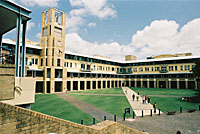Automobile Engine Technology - MECH9761
Faculty: Faculty of Engineering
School: School of Mechanical and Manufacturing Engineering
Course Outline: http://www.mech.unsw.edu.au/
Campus: Sydney
Career: Postgraduate
Units of Credit: 6
EFTSL: 0.12500 (more info)
Indicative Contact Hours per Week: 3
Enrolment Requirements:
None
CSS Contribution Charge: 2 (more info)
Tuition Fee: See Tuition Fee Schedule
Further Information: See Class Timetable
View course information for previous years.
Description
This course introduces the fundamentals of how the design and operation of automobile engines affect their performance and environmental impact. The fluid flow, thermodynamics, combustion, and fuel properties are studied with reference to engine power, efficiency, and pollutant formation. Students examine the design features and operating characteristics of different types of automobile engines: conventional gasoline, diesel engines, and the next-generation combustion engines including direct-injection (DI), low-temperature-combustion (LTC) diesel, homogeneous-charge compression-ignition (HCCI) engines. The key features of alternative fuel, hybrid, and fuel-cell powered engines are also discussed. The course includes a term project of literature review and presentation performed by 3~4 students as a project team. This is a postgraduate course; however, it is also available to undergraduate students as a technical elective.









